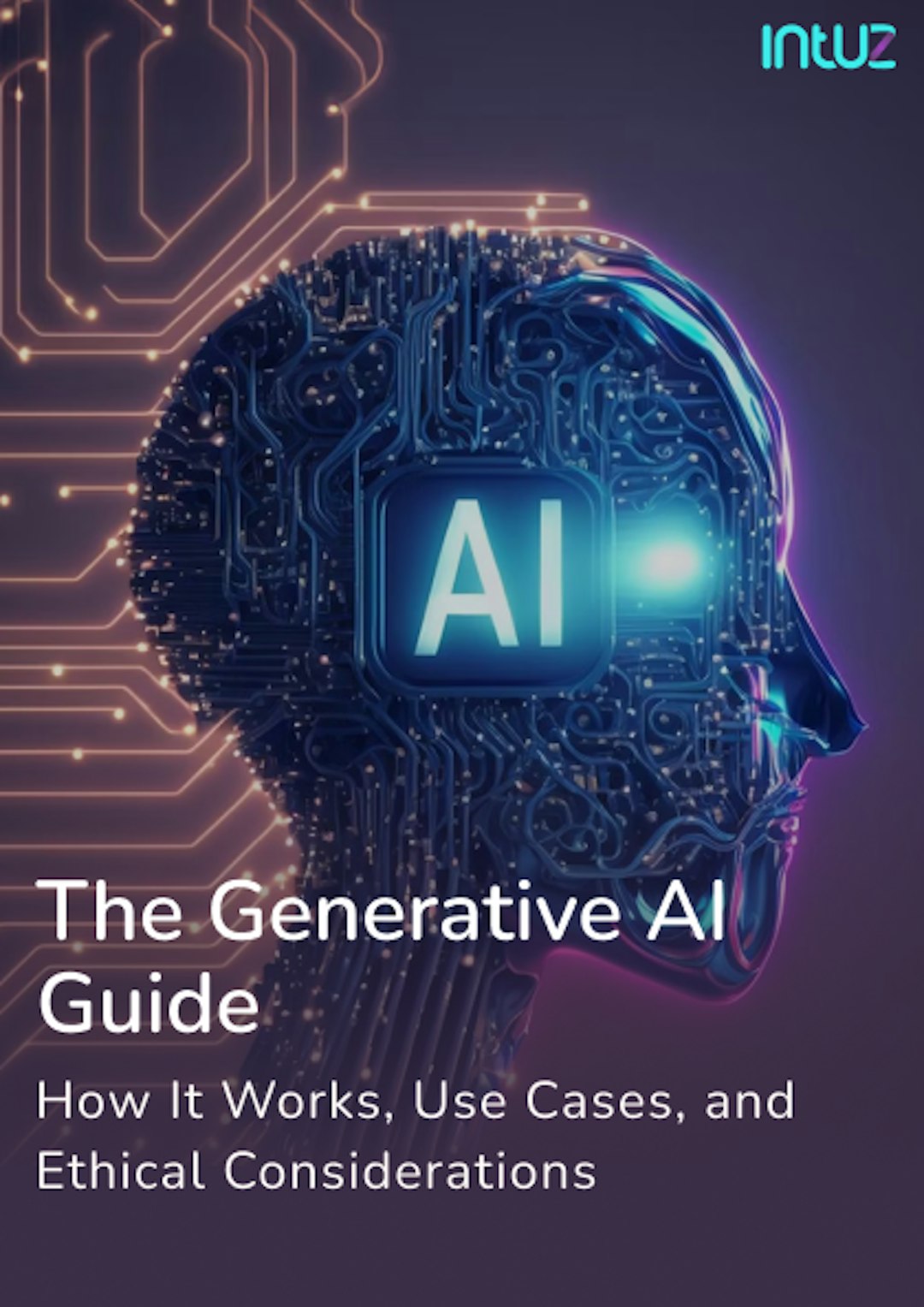Table of Content
With 2.71 billion online shoppers globally (and growing), eCommerce businesses have a lot on their plates if they continue fulfilling customer demand and exceeding expectations.
From supply chain optimization to inventory forecasting to cross-selling/upselling activities, there’s much for them to do to stay ahead—and that’s exactly where Artificial Intelligence (AI) can help.
But before we delve into that, let’s understand the evolution of eCommerce online shopping.
Traditionally, customers browsed through the products and bought the ones they liked from an online retailer's platform. On the other hand, the eCommerce business kept them engaged with social media posts and emails about upcoming sales.
The journey from mere selling to anticipating trends
However, AI uses predictive analytics to unlock powerful insights from their sales and industry data to proactively understand what customers want and deliver it to them wherever they might be.
The focus is now on boosting customer reach and driving higher conversions—a boon in today’s ultra-competitive market, where supply chains should be optimized to deliver orders faster than ever and where personalized product recommendations must feel like a trusted friend’s advice.
No wonder 84% of eCommerce businesses are either actively implementing AI solutions into their workflows or making it a top priority. Let's get started to know more in detail!
Benefits of AI for E-Commerce Businesses
1. Increased sales and conversions
AI helps you gather and analyze customer journeys, behavior, and preferences to personalize the sales funnel and tailor product recommendations. It also automates repetitive tasks such as order processing, customer queries, and marketing campaigns.
You can ensure a consistent and efficient shopping experience with the correct data, leading to higher conversion rates.
2. Improved customer experience
Due to limited data analysis capabilities, traditional recommendation systems often fail to provide accurate suggestions.
AI, however, can analyze vast amounts of data to predict and recommend products that align with individual customer preferences. An AI shopping assistant can enhance the overall shopping journey and increase the likelihood of repeat purchases.
3. Customer support automation
Similarly, customer support was once limited by operational hours and human resources. Not anymore. AI chatbots can now provide round-the-clock support, resolving queries and issues promptly, thereby improving customer trust, satisfaction, and retention.

4. Optimized inventory management
Until a decade ago, inventory management systems struggled with issues like stockouts and overstocking, which resulted in financial losses. Stockouts led to missed sales opportunities and dissatisfied customers while overstocking tied up capital and increased storage costs.
By predicting demand, AI can optimize inventory and ensure the right amount of stock is available at the right time. This results in faster delivery times and lower operational costs.
5. Dynamic search functionality
Remember when traditional keyword-based search systems failed to understand user intent, leading to irrelevant results? For example, searching for “best running shoes” would return a mix of articles on running techniques, online stores selling shoes, and unrelated advertisements.
Today, AI enhances search accuracy by comprehending intent and context, providing more relevant and precise search results.
This means searching for “best running shoes” would yield tailored recommendations, user reviews, and purchasing options that align more closely with the customer’s search intent. End result? Quick sales and increased buyer satisfaction.
Custom AI Solutions for your E-Commerce Business!
Book an AI ConsultationTechnologies Powering AI in E-Commerce
AI is not a singular technology; it encompasses various models. There are four leading AI technologies used in this sector:
1. Machine Learning (ML) and deep learning
ML is a subset of AI where algorithms learn from data to make predictions or decisions without being explicitly programmed.
For example, an ML algorithm can be trained on historical sales data to predict future sales trends. Over time, as it processes more data, the algorithm’s predictions improve.
Deep learning, a subfield of ML, involves neural networks with many layers (hence “deep”) that can model complex patterns in large datasets.
For instance, a deep learning model can recognize images of products by learning from thousands of labeled images. Initially, the model might misclassify some products, but as it is fed more labeled images, it improves its accuracy.
2. Natural Language Processing (NLP)
Simply put, NLP enables computers to understand, interpret, and respond to human language. In eCommerce, this technology powers AI chatbots to handle customer inquiries, process orders, and provide personalized recommendations.
For example, when a customer asks a chatbot for the status of their order, NLP allows the latter to understand the query and retrieve the relevant information.

Beyond chatbots, NLP is used for sentiment analysis. It analyzes customer reviews to determine the overall sentiment (positive, negative, or neutral). This helps eCommerce businesses gauge customer satisfaction and identify areas for improvement.
NLP also enables language translation, making it easier for them to cater to linguistically diverse customers globally.
3. Big Data analytics
Big Data refers to the massive volumes of data generated from various sources, such as customer interactions, transaction records, and social media activities. This data is important for training AI models.
The more data these models have, the better they can learn and make accurate predictions for eCommerce businesses.
For example, an AI model trained on a large dataset of customer purchase histories can more accurately predict which products a customer is likely to buy. On the other hand, analytics tools process and analyze this data, uncovering patterns and trends that inform business strategies.
Key Use Cases of AI in E-Commerce
1. AI-driven personalization and product recommendations
Product recommendations have been a feature of eCommerce websites for a while now. Indeed, 71% of potential customers regard personalized experiences as an expectation when shopping online. Today, generative AI based personalized product recommendations are going beyond standard suggestions to curate dynamic, hyper-targeted selections based on browsing behavior, preferences, and even nuanced user intent.
With AI, you can offer hyper-personalized recommendations based on predictive analytics. These deliver powerful insights about the customer’s spectrum of tastes and, thus, what adjacent products they might be likely to buy.
For example, if you learn that a customer has been browsing baby formula and neonatal yoga classes, you can reasonably assume that they’ll be interested in baby blankets and maternity wear and thus:
- Share ads for those products wherever they happen to be browsing
- Personalize their product feed (it’s the first page they see on landing back on an eCommerce website)
Amazon, for instance, performs collaborative filtering to suggest products that other users with similar interests have purchased or viewed.
Moreover, AI-powered recommendation engines can detect patterns related to the frequency of purchases (such as baby formula every two weeks) and then send out proactive push notifications to remind users to stock up on time or offer a deal on bulk purchases via email.
2. Automated customer service and chatbots
Traditional chatbots have been around for a while, and they’re great for answering FAQs or dealing with basic queries about order status.
AI, however, can create powerful chatbots powered by NLP, which can understand human speech across dialects and linguistic nuances and respond in a similar fashion.
This helps customers feel like they’re speaking to someone who “gets” them and increases the likelihood that they’ll be satisfied with their interaction.
Plus, these chatbots can use sentiment analysis to detect when it is time to hand over to a human agent, enabling a smooth, continuous-resolution experience.
As for customer impressions of chatbots, 40% don’t mind whether they’re helped by humans or an AI as long as they receive an answer. Thus, you shouldn’t hesitate to invest in chatbots and enjoy the significant time and money savings they bring.
3. AI-optimized dynamic pricing and promotions
Real-time pricing adjustments are one of the most powerful strategies for winning your customers away from the competition. One way of doing this is by offering an instant discount valid for a limited period (an hour or less) to spur the customer towards a purchase.
However, a more impactful strategy is to leverage sales data, competitor pricing, and demand patterns to proactively adjust prices in real time while the customer is comparing choices across competitor websites before making a purchase. This is called AI dynamic pricing.
When done correctly, these real-time price adjustments can catch the customer at the right moment and nudge them toward an immediate conversion.
Moreover, dynamic pricing helps the customer feel that you care about their needs and proactively meet them, boosting their impression of you. It improves cart abandonment rates and builds long-term customer loyalty.
Explore how a Sportswear E-Commerce brand integrated Custom AI Solutions!
Know More4. Intelligent inventory management and demand forecasting
You must know and follow some broad patterns, like pushing the sale of seasonal items during holidays or offering discounts during Black Friday. With predictive analytics, though, you can tap into various data pools.
This includes historical sales data, inventory data, customer engagement heat maps, user reviews, social media patterns, geographic demand patterns, and so on to predict inventory requirements for different contexts precisely.
This is invaluable for avoiding stockouts, improving delivery time, and reducing the cost of maintaining inventory items that won’t sell.
For example, in advance of an anticipated football game, you can stock up on jerseys for each team and popular game-time snack options. And if there’s a heat wave predicted, you can promote sales of lightweight clothing, caps, and sunscreen.
5. AI-powered fraud detection and prevention
AI is beneficial when it comes to detecting patterns of suspicious behavior. ML models use customer data to craft different types of user profiles and a roster of normal financial behaviors for those profiles.
The models then use that as a benchmark to flag unusual behaviors, such as higher-than-average transaction values, multiple transactions within a short period of time, and transactions from unfamiliar locations.
These behaviors can then be flagged for further review. If fraud is confirmed, measures can be taken to cancel the transaction and request new financial information, if necessary.

6. Voice search and enhanced product discovery
Voice-based searches on eCommerce websites have been on the uptick, and at the heart of successful voice search is speech recognition AI.
Once again, NLP helps the voice assistant understand the query, interpret different accents, regional terms, and any pauses or mispronunciations, and then guide the customer toward what they want.
Voice search is handy for those on the move or customers who have difficulty with traditional type-based queries. It’s also faster than typing out queries, allowing customers to complete the purchase process faster.
7. Image recognition for product recommendations
Often, customers are keen to shop for a product they’ve seen in a magazine or a friend’s house. AI-powered eCommerce can make this possible!
The customer simply has to upload a picture of the item they want, and AI can match them with the most similar products on the eCommerce site’s inventory based on attributes like design, shape, and size.
ASOS Style Match, Sephora Beauty, and Nykaa offer much popular virtual assistance in eCommerce fashion and lifestyle. Similarly, IKEA and Houzz allow users to take photos of home decor or furniture to identify and suggest similar products on their platforms.
Image recognition technology is also used to recommend products that fit the same aesthetic as the requested item, such as matching shoes or a bag in a complementary color. This serves to expand the range of options for the customer and nudge them towards a bigger checkout list.

8. Customer churn prediction and prevention with AI
Combating customer churn is one of the most significant challenges for an eCommerce business, as acquiring a new customer is significantly more expensive than retaining one, according to HBR.
Predictive analytics helps here by delivering data-powered insights on targeting customers at risk of leaving. For instance, if you gather data on significant indicators of churn, such as website bounce rate or cart abandonment rate, you can target those customers with the following:
- Personalized emails reminding them to complete their purchases
- Website ads for recommended products
- Limited-period discounts
AI can put data to good use and help you improve your bottom line by driving more sales. And if you don’t believe in the power of customer retention, don’t be surprised when we tell you boosting retention rates by 5% increases profits by 25% to 95%.
9. AI-enhanced remarketing and retargeting strategies
Generative AI in digital marketing has made it possible for eCommerce businesses to reach customers across multiple platforms and remind them—using personalized language—about products they were previously browsing.
It accomplishes this by creating customer profiles through machine learning models, understanding each profile’s behaviors and motivations, and then crafting personalized content most likely to guide each profile towards a conversion.
This content can take the form of ads with nudges to buy a previously browsed item, an email update about seasonal products for a festival the customer celebrates, or even dynamic video ads with personalized captions that address the customer by name and use a content style most likely to appeal to them.
Generative AI-Powered Chatbots For E-Commerce Customer Support!
Read NowHow E-Commerce Businesses Can Leverage AI for Better Sales
1. Assess your business needs
The first step in using AI is understanding where it can impact your eCommerce business most.
Here’s food for thought:
- Are your customers experiencing delays in order processing?
- Is overstocking or stockouts affecting your bottom line?
For appropriate answers, evaluate your current operations. Dig deep and don’t miss any department. Identify customer pain points and delivery bottlenecks—regardless of how small or big they are.
Only after you have clarity on that will you be able to create an AI framework for your eCommerce business.
For instance, AI-powered chatbots and virtual assistants can help you support your customers better by providing instant responses to common queries, reducing the load on your support team.
AI-driven analytics can help you optimize inventory management by predicting demand trends.
To ensure a successful AI integration, consider seeking expertise from an AI development company like Intuz.
They can provide valuable insights and tailored AI eCommerce solutions that align with your business goals, helping you navigate the complexities of AI adoption.
2. Develop an AI implementation strategy
The second step is to define clear goals for your AI initiative.
What do you hope to achieve with this exercise?
Whether it’s reducing customer wait times, increasing repeat purchases, or automating sales forecasting, having specific objectives will guide your AI journey.
Then, identify your needed resources, including data, technology, and skilled personnel.
For example, to improve customer satisfaction by reducing delivery times, you must aim to cut average delivery times from five days to two days within six months. This requires gauging your current logistics, technology infrastructure, and workforce.
Your research might suggest deploying:
- Additional delivery personnel
- Advanced route optimization software
- Upgraded warehouse management systems
The point is to align your goals with practical steps and resources needed for successful implementation.

3. Start with small, scalable solutions
Once you’ve researched and defined your strategy, the next step is to implement it. However, the key to successfully adopting AI is to go small.
Focus on specific, manageable applications that deliver quick wins and measurable results. This approach will equip you to test the effectiveness of AI solutions before scaling them across your entire eCommerce operation.
Referring to the example of reducing customer wait times, you could first deploy an AI chatbot on your website to handle inquiries. Then, monitor its performance, gather feedback, and make necessary adjustments over a period—maybe three months.
As you gain confidence and experience, you could consider expanding AI applications to other areas, such as personalized marketing (to increase repeat purchases) and predictive analytics (to automate sales forecasting).
4. Invest in data infrastructure
It’s not a secret that AI models learn from data, so the quality of the data you feed into the systems directly impacts the performance of your AI solutions. Invest in high-quality data collection, cleaning, and management practices to achieve the desired outcomes.
For example, if you want to reduce equipment downtime through predictive maintenance, the quality of sensor data from machinery is crucial. This involves collecting and analyzing data on machine vibrations, temperature, and operational cycles.
With correct data, you can proactively predict potential failures and schedule maintenance, minimizing unplanned downtime and increasing operational efficiency.
In addition to quality, data security and privacy are paramount. You must ensure your data infrastructure complies with relevant regulations and best practices to protect customer information and maintain trust.
5. Embrace a data-driven culture
Fostering a data-driven culture within your eCommerce business is essential to fully realizing the benefits of AI. And this cultural shift starts with you. Here’s what you can do:
- Equip your employees with advanced data analytics tools and platforms that facilitate easy data access, visualization, and analysis.
- Define clear roles and responsibilities for data management, create standardized data processes, and implement AI-powered tools to maintain data integrity and compliance.
- Create interdisciplinary teams that combine different perspectives and expertise to analyze and interpret data—generate comprehensive insights, and drive better decision-making.
- Invest in training programs to improve employee data literacy at all levels. This includes understanding data basics, data analysis techniques, and using data to inform decisions.
Adopting a data-driven approach allows you to position your eCommerce business for better outcomes. Custom AI solutions from Intuz can further enhance this by providing personalized insights and automation capabilities that align with your unique requirements.
The Future of AI in E-Commerce: What Does It Hold?
First, let’s consider the revolutionary impact of emotional AI and AR/VR technologies. Emotional AI’s ability to understand and respond to human emotions in real-time by analyzing facial expressions, voice tones, and even typing patterns results in more empathetic and responsive customer service.
Coupled with the immersive potential of Augmented Reality (AR) and Virtual Reality (VR), these technologies will enable hyper-targeted marketing and personalized shopping experiences that were once the stuff of science fiction.
For example, a customer shopping for furniture could use an AR app to visualize how different pieces would look in their home, with suggestions adapted based on their emotional responses to various styles and colors.
Similarly, VR could offer virtual store experiences where customers can explore products in a 3D environment, with AI providing personalized recommendations and real-time assistance. Predictive shipping is another critical area where AI in eCommerce is making significant strides.
The technology leverages customer behavior to predict purchases before they are made. For example, if a customer frequently buys pet food every month, Al will preemptively ship the item to a nearby warehouse or even directly to the customer’s door, reducing delivery times.
Lastly, as sustainability becomes a key concern, Al will drive eco-friendly eCommerce practices. It will optimize supply chains to reduce carbon footprints, suggest sustainable products to customers, and even help in recycling and waste management.
The Ultimate Generative AI Guide
Read NowOver to You
In the past, E-Commerce businesses saw AI as a “nice to have” feature to impress customers and encourage repeat visits. Now, they rely on this advanced technology to grow, manage global operations, and meet customer demands across multiple channels.
Why AI in eCommerce matters:
- Personalized recommendations and targeted marketing increase conversion rates.
- Automate inventory management, customer service, and supply chain operations.
- Provide 24/7 support with AI chatbots and tailored shopping experiences.
- Leverage predictive analytics for better forecasting and strategic planning.
Bottom line for you? Don’t miss out on these benefits.
Make AI a key part of your strategy for business growth. To help you get started, Intuz is offering a 45-minute free consultation. During this session, our experts will:
- Discuss the specific pain points your E-Commerce business faces regarding AI integration.
- Provide a customized roadmap to help you boost growth through AI. (This roadmap is 100% free and actionable, so you know this call would be more valuable than you can imagine.)
What are you waiting for? Book your free AI consultation with Intuz today.






